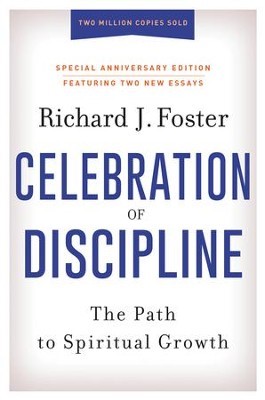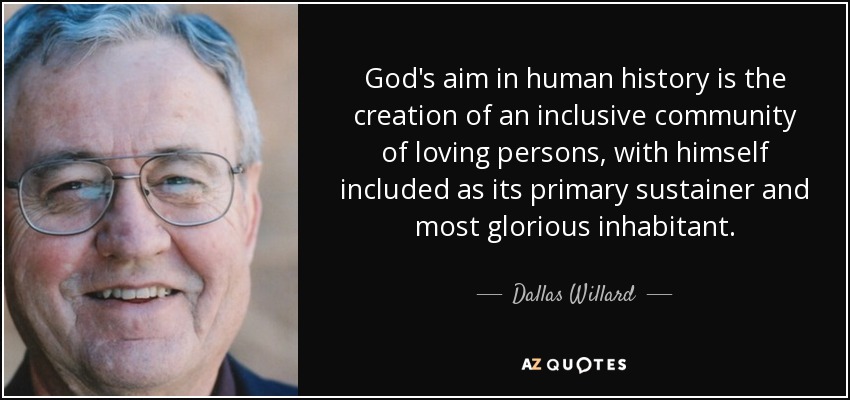Click here to return to Blog Post Intro

Shortly after God led the people of Israel out of bondage from Egypt, the people found God’s unmediated presence too awful, too glorious and begged, “Let not God speak to us, lest we die” (Exodus 20:19). So, Moses became their mediator. Thus began the great ministry of the prophets whose function was to hear God’s word and bring it to the people.
But a day came when Israel rejected even the prophet in favor of a king. From that point on the prophet was the outsider. He was a lonely voice crying in the wilderness; sometimes obeyed, sometimes killed, but almost always on the outside.
Then, when Jesus came, He demonstrated what it meant to live in response to the voice of the Father. He taught them that they, too, could hear the heaven-sent voice and most clearly when together. Consider the words of Jesus in Matthew 18:19-20:

In the book of Acts, the early church became a gathered people. “Now the company of those who believed were of one heart and soul, and no one said that any of the things which he possessed was his own, but they had everything in common. And with great power the apostles gave their testimony to the resurrection” (Acts 4:32-33).
The early church became a fiery band of witnesses, declaring everywhere that Christ’s voice could be heard and his will obeyed. Perhaps the most astonishing feature of that incendiary fellowship was their sense of corporate guidance. It was beautifully illustrated in the calling forth of Paul and Barnabas to tramp the length and breadth of the Roman empire with the good news of the kingdom of God (Acts 13:1–3). Their call came when a number of people had been together over an extended period of time. It included the use of the Disciplines of prayer, fasting, and worship. Having become a prepared people, the call of God arose out of their corporate worship:

Under corporate guidance the early Church faced and resolved its most explosive issue (Acts 15). Some freelance Christians had gone up to Antioch and had begun preaching the necessity of circumcision for all Christians. Appointed elders and apostles gathered in the power of the Lord not to jockey for position or to play one side against another, but to hear the mind of the Spirit. It was no small task. There was intense debate. Then in a beautiful example of how individual guidance impinges upon corporate guidance, Peter told about his experience with the Italian centurion Cornelius. As he spoke, the ever-brooding Spirit of God did a wonderful work. When Peter finished, the entire assembly fell into silence (Acts 15:12). Finally, the gathered group came into what must be called a glorious, heaven-sent, unified commitment to reject cultural religion and to hold to the everlasting gospel of Jesus Christ. They concluded, “It has seemed good to the Holy Spirit and to us…” (Acts 15:28). They had faced the toughest issue of their day and had discerned the voice from on high. This is the high watermark in the book of Acts.
No doubt those experiences in discerning the will of God in community contributed greatly to Paul’s understanding of the Church as the body of Christ. He saw that the gifts of the Spirit were given by the Spirit to the body in such a way that interdependence was ensured. No one person possessed everything. Even the most mature needed the help of others. The most insignificant had something to contribute. No one could hear the whole counsel of God in isolation.
It is possible for business decisions to be made under a sense of the corporate leading of the Holy Spirit. Quakers have done so for years and have demonstrated the feasibility of such an approach. Business meetings should be viewed as worship services. God will implant a spirit of unity when the right path has been chosen and trouble us with restlessness when we have not heard correctly.
Unity rather than majority rule is the principle of corporate guidance. Spirit-given unity goes beyond mere agreement. It is the perception that we have heard the Kol Yahweh, the voice of God. A classic and dramatic illustration occurred in 1758. John Woolman and others had pricked the conscience of the Society of Friends over their involvement in the demonic institution of slavery. As the Philadelphia Yearly Meeting gathered for its business meetings that year, the slavery issue was a major agenda item. A great deal was at stake and the issue was hotly debated.
John Woolman, with head bowed and tears in his eyes, sat through the various sessions in complete silence. Finally, after hours of agonizing prayer he rose and spoke. “My mind is led to consider the purity of the Divine Being and the justice of His judgment, and herein my soul is covered with awfulness… Many slaves on this continent are oppressed and their cries have entered into the ears of the Most High… It is not a time for delay.”
Firmly and tenderly Woolman dealt with the problems of the “private interests of some persons” and the “friendships which do not stand upon an immutable foundation.” With prophetic boldness he warned the Yearly Meeting that if it failed to do its “duty in firmness and constancy” then “God may by terrible things in righteousness answer us in this matter.” The entire Yearly Meeting melted into a spirit of unity as a result of this compassionate witness. They responded as one voice to remove slavery from their midst.
John Greenleaf Whittier states that those sessions “must ever be regarded as one of the most important religious convocations in the history of the Christian Church.” That united decision is particularly impressive when we realize that the Society of Friends was the only body that asked slaveholding members to reimburse their slaves for their time in bondage. It is also striking to realize that under the prompting of the Spirit, Quakers had voluntarily done something that not one of the antislavery revolutionary leaders—George Washington, Thomas Jefferson, Patrick Henry—was willing to do. So influential was the united decision of 1758 that by the time of the signing of the Declaration of Independence, Quakers had completely freed themselves from the institution of slavery.
As Virgil Vogt of Reba Place Fellowship says, “If you cannot listen to your brother, you cannot listen to the Holy Spirit.”
The Limits of Corporate Guidance
We should be aware that dangers exist in corporate guidance. Perhaps the most menacing danger is manipulation and control by leaders.
Corporate guidance can be twisted, so that it becomes a kind of quasi-magic formula through which leaders can impose their will upon individuals—an authorized system through which all differing opinions can be brought into line. Such manipulative perversion results in the stifling of fresh spiritual vitality.
The prophet Isaiah tells us that the coming Messiah “will not break a bruised reed, or quench a smoldering wick” (Isaiah 42:3; Matthew 12:20). It is not the way of Jesus to crush the weakest person or to snuff out the smallest hope. Tenderness toward each individual situation must inform all our deliberations.
There is also danger in the opposite direction. It is possible for a hard-hearted and stiff-necked people to hinder Spirit-inspired leaders. While leaders need the counsel and discernment of the believing community, they also need the freedom to lead. If God has called them to lead, they should not have to bring every detail of life to the community. We must never be seduced by Western democratic ideals into believing that every person must have an equal say about every triviality in the community’s life. God appoints authoritative leadership in his Church so that his work may be done upon the earth.
Another danger is that corporate guidance will become divorced from biblical norms. Scripture must pervade and penetrate our thinking and acting. There must always be the outward authority of Scripture as well as the inward authority of the Holy Spirit. In fact, Scripture itself is a form of corporate guidance. It is a way God speaks through the experience of the people of God. It is one aspect of “the communion of the saints.”
Finally, we must recognize that corporate guidance is limited by our finitude. We are fallible human beings and there are times when, despite our best efforts, our own prejudices and fears keep us from a Spirit-led unity. Sometimes we simply see things differently. Paul and Barnabas, for example, could not agree on whether to take John Mark with them on their second missionary journey. Luke says “a sharp contention” developed between them (Acts 15:39). We should not be surprised if we have the same experience in our ministry efforts.
Ministry teams at times do part ways, and churches at times do split. Let us do all we can to make any such separation as gracious as possible. Let us pray for each other and ask God’s blessing upon one another. Let us have the confidence of the apostle Paul that “in every way, whether in pretense or in truth, Christ is proclaimed; and in that I rejoice” (Philippians 1:18).
Such a community lives under the immediate and total rulership of the Holy Spirit.
They are an obedient army of the Lamb of God living under the Spiritual Disciplines, a community in the process of total transformation from the inside out, a people determined to live out the demands of the gospel in a secular world.
Such a community, cast in a rare and apostolic mold, constitutes a new gathering of the people of God. May almighty God continue to gather such people in our day.

